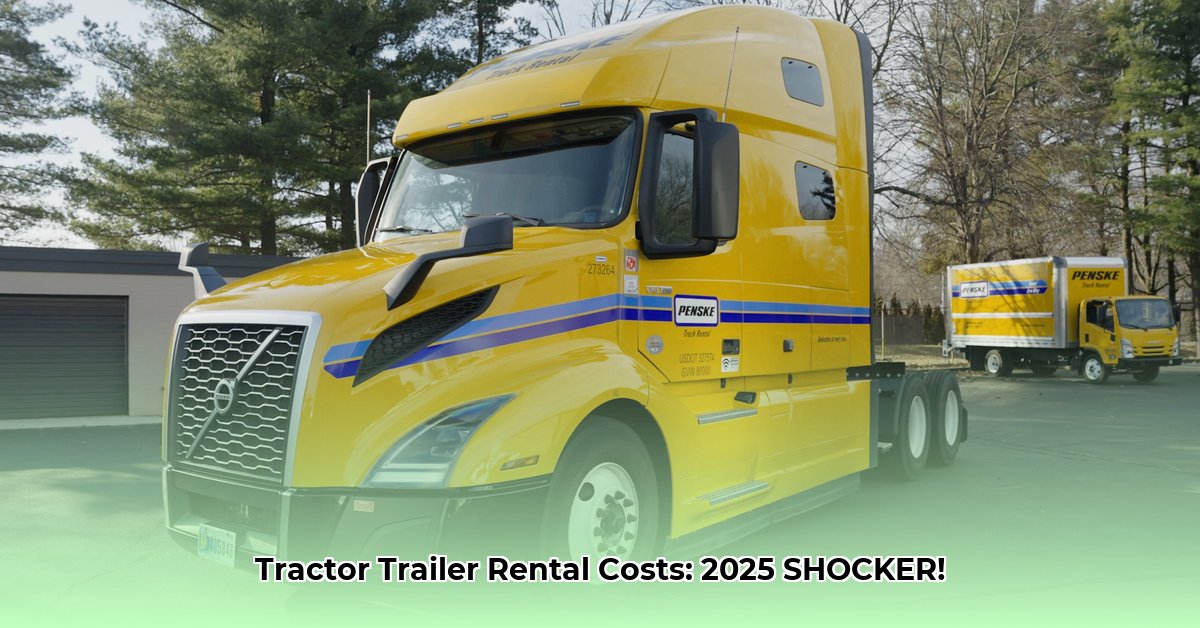
Renting a tractor-trailer can be a cost-effective solution for short-term hauling needs, but understanding the associated expenses is crucial. This guide provides a comprehensive overview of tractor-trailer rental costs in 2025, helping you make informed decisions and secure the best possible value. For more information on insurance, see this helpful guide.
Daily Rental Rates: Understanding the Starting Point
Daily rental rates for tractor-trailers vary considerably, ranging from approximately $170 to $215 per day. However, this is merely a baseline figure. Several factors significantly influence the final cost. The size and type of truck—a single-axle truck for lighter loads versus a tandem-axle truck for heavier ones—directly impact the daily rate. Adding features like a sleeper cab adds to the expense. Fortunately, rental companies often offer deals and discounts, so comparing prices is essential. Remember to factor in the potential for discounts and bundle deals.
Choosing the Right Truck: Matching Your Needs
Selecting the correct tractor-trailer is paramount. The ideal truck depends entirely on your specific transportation requirements. A single-axle truck is suitable for lighter loads and shorter distances, whereas a tandem-axle truck is necessary for heavier loads and longer hauls. For overnight journeys, a sleeper cab provides crucial comfort and safety. Specialized trucks are also available for unique cargo such as refrigerated goods or hazardous materials, each commanding a different price point. Choosing the right truck optimizes both cost and efficiency. What type of cargo are you transporting? This question is key to determining the appropriate truck and associated costs.
Beyond the Daily Rate: Hidden Costs to Consider
The advertised daily rate represents just a fraction of the total cost. Several additional expenses contribute significantly to the overall expenditure. Fuel costs, highly volatile and dependent on distance traveled and current market prices, are a major factor. Environmental fees, designed to offset the environmental impact of trucking, vary by location and rental company. Comprehensive insurance is mandatory; the cost depends on the rental duration and selected coverage level. These often-overlooked costs can have a substantial impact on your budget. How much should you budget for these additional expenses? Let's explore this further.
| Cost Category | Potential Impact on Total Rental Cost | Notes |
|---|---|---|
| Fuel | Major impact; depends on distance and fuel prices. | Consider fuel-efficient driving techniques to minimize fuel consumption. |
| Environmental Fees | Varies by company and location; plan accordingly. | Research local environmental regulations to understand potential costs. |
| Insurance | Essential; cost based on coverage and rental duration. | Secure comprehensive insurance offering adequate protection. |
| Trailer Rental (if needed) | Adds another daily expense. | Factor in trailer rental costs if you need a separate trailer. |
| Potential Maintenance | Though less likely with short-term rentals, it's a possibility. | Build a contingency plan for potential maintenance expenses. |
Smart Strategies for Managing Rental Costs
Minimizing expenses requires a strategic approach, differing slightly depending on the rental duration.
Short-Term Rentals (Less Than a Year):
- Negotiate: Don't hesitate to negotiate rental rates with different companies; flexibility often exists.
- Seek Deals: Actively search for special offers; many rental companies run promotions.
- Secure Comprehensive Insurance: Prevent unexpected costs with comprehensive coverage.
Long-Term Rentals (3-5 Years or More):
- Consider Leasing: Long-term leasing offers potential cost advantages.
- Conduct a Total Cost Analysis: Assess all costs (rental, fuel, maintenance, insurance) before committing.
- Prioritize Fuel Efficiency: Implement fuel-saving strategies, including driver training and efficient route planning.
Tips for Securing the Best Deal
To maximize value, adopt the following approach:
- Thorough Comparison: Obtain multiple quotes from different rental companies.
- Clear Needs Assessment: Precisely define your transportation needs to avoid unnecessary costs.
- Holistic Cost Consideration: Evaluate the total cost, including incidental expenses.
- Reliability vs. Rate: A slightly higher daily rate could offer greater reliability and less downtime.
- Insurance Scrutiny: Carefully examine insurance coverage options; don't overpay.
- Take Your Time: Avoid hasty decisions; comparing options thoroughly is essential.
Remember, the trucking industry is dynamic. Stay informed about market trends, fuel prices, and regulatory changes to make cost-effective decisions. Even seemingly minor fluctuations can impact overall rental expenses.
How to Compare Semi-Truck Rental Insurance Options
Proper insurance is critical when renting a tractor-trailer. This section outlines how to compare insurance options and secure adequate protection at a reasonable cost.
Understanding Coverage Types
Several insurance types are relevant:
- Liability Insurance: Protects against financial losses from accidents you cause.
- Physical Damage Insurance: Covers damage to the rented truck.
- Cargo Insurance: Protects goods being transported.
- Non-Trucking Liability ("Bobtail"): Covers liability when the truck isn't under dispatch.
- Trailer Interchange Insurance: Covers liability for damage to swapped trailers.
Comparing Insurance Quotes: A Step-by-Step Guide
- Identify Needs: Assess rental needs, including cargo type, operating radius, and personal use.
- Gather Quotes: Obtain multiple quotes from various insurers.
- Analyze Coverage: Compare price, policy limits, deductibles, and exclusions.
- Consider Reputation: Assess the insurer's reputation and financial stability.
- Negotiate: Negotiate terms, especially concerning deductibles.
Factors Affecting Insurance Costs
Numerous factors influence insurance premiums:
- Driver experience: A clean driving record leads to lower premiums.
- Truck type: Specialized or hazardous material trucks command higher premiums.
- Rental duration: Longer rentals may offer slightly lower daily rates.
- Safety features: Advanced safety features can reduce premiums.
Securing appropriate insurance protects your investments and minimizes financial risk. Thorough comparison of options is key.